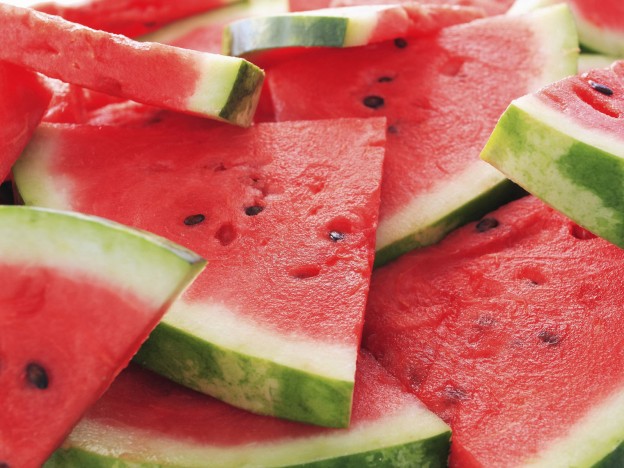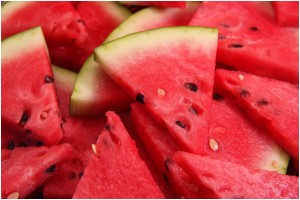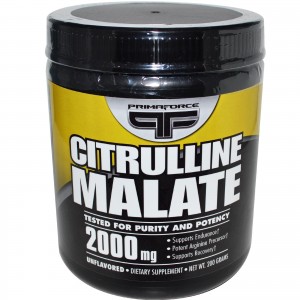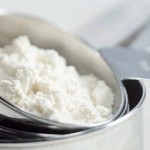By Anthoney J. Andersen – Steroidal.com
The world of bodybuilding can be a very competitive and time-consuming business, so making every set, every repetition – every second – count is essential to increasing your body’s overall strength and mass.
In this day in age, staying ahead of the competition – whether it is modeling, acting, bodybuilding, or professional athletics – is fundamental. A lot of people are turning to plastic surgery to make themselves look younger, popping diet pills to shed the pounds, or consuming the next groundbreaking performance enhancing drug (both legal and illegal) in order to advance themselves further in both life and their career.
It seems like every few months, manufacturers and marketers of the health and nutrition industry, are trying to hype of some new supplement as the “next big thing” in performance enhancement.
However, one of the natural enhancing supplements that is circulating the athletic world these days is the amino acid known as L-citrulline malate.
L-citrulline is an amino acid that is both produced naturally by the body and can be found in certain foods like watermelon. According to WebMD, L-citrulline is used to treat chronic health conditions like Alzheimer’s disease, dementia, sickle cell disease and diabetes. It’s also used for bodybuilding, increasing energy and for improving athletic performance.
HOW IT WORKS
If you’re regularly involved in some type of strenuous physical activity (three to four times a week), then you probably experience a great deal of muscle fatigue brought on by the tearing of your muscle fibers.
Muscle fatigue can decrease the output of energy your body expels during your workout; the less energy your muscles have, the fewer sets/reps you’ll be able to knock out – which will lead to the slowdown of strength and muscle gain.
According to Livestrong.com, citrulline is considered a nonessential amino acid, meaning that your body produces enough of it, so vitamins and supplements containing citrulline are not necessary.
However, research has found that L-citrulline malate – the chemical form of citrulline available as a supplement – can help increase energy and may help lower your risk of certain chronic health problems.
As mentioned before, you can obtain citrulline from supplements and foods. Nobel prize recipient, Professor Louis Ignarro, says that when the amino acids – citrulline and arginine – are combined, our body’s cells are encouraged to produce a beneficial gas known as nitric oxide.
According to Naturalsociety.com, nitric oxide is a gas that the body naturally generates to help with neurotransmission, blood vessel dilation and reduction of blood pressure.
Without sufficient nitric oxide, our bodies can feel overworked and fatigued. Nitric oxide allows blood vessels to expand for better blood flow throughout the body, while helping with the delivery of essential nutrients – like protein – to be dispatched into the muscles.
Citrulline also helps reduce lactic acid and ammonia in muscle tissues, while producing energy and assisting in the proper function of the immune system, according to Menshealth.com.
Citrulline may also aid in health and athletic performance by:
- Enhancing the utilization of essential amino acids during exercise.
- Improving recovery time after exercise by diminishing delayed-onset muscle soreness.
- Reducing/inhibiting the increase in plasma insulin levels that usually arises after high-intensity exercise.
FRUITS
One of the richest sources for citrulline is found in watermelon – both the fruit and the rind. According to WebMD, amino acids found in watermelon can help battle pre-hypertension way before it becomes cardiovascular disease.
In addition to its high content of citrulline, watermelon is full of vitamins A, B-6 and C – plus potassium, fiber and the antioxidant lycopene.
“More citrulline – about 60 percent – is found in watermelon rind than in the flesh,” says Bhimu Patil, a researcher and director of Texas A&M’s Fruit and Vegetable Improvement Center. “Citrulline is found in all colors of watermelon and is highest in the yellow-fleshed types.”
WHO SHOULD USE CITRULLINE
- Physique competitors (bodybuilders).
- Athletes competing in aerobic and/or anaerobic events/sports.
- Powerlifters.
- Individuals looking to increase blood flow and achieve that ‘pump’ look during exercise.
- Avoid use if you suffer from citrullinemia – an inherited disorder that causes ammonia and other toxic substances to accumulate in the blood – which would only exacerbate the issue.
- For optimal results, citrulline should be ingested 15-30 minutes before training.
- Begin with a once-daily dose of 6-7g and increase to 15-20g – split into multiple doses throughout the day – if desired.
CONCLUSION
If you find your athletic performance hitting the proverbial wall – and you need that extra edge to help launch you through it – then consider going down the route of natural remedy.
There are a lot of performance enhancing supplements on the market – and black market – that will help you achieve your goals at a much faster rate (steroids and pro-hormones, for example), but they can also be detrimental to your health.
So, the next time you’re at the market or your local vitamin store, consider purchasing a few watermelon or an L-citrulline malate supplement (pills or powders) that will help you achieve the same results without corrupting your heart and liver.
Choose wisely.









